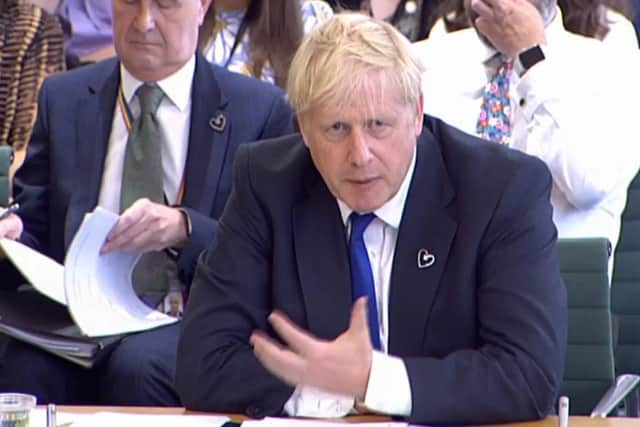Boris Johnson refuses to resign and sacks Michael Gove following calls to quit from Cabinet colleagues
and live on Freeview channel 276
The Prime Minister met ministers in No 10 this evening (July 6), where he was told he had lost the confidence of the Tory party and could not continue in office.
Home Secretary Priti Patel, Business Secretary Kwasi Kwarteng, Transport Secretary Grant Shapps, Northern Ireland Secretary Brandon Lewis and Welsh Secretary Simon Hart were among the Cabinet ministers telling Mr Johnson to stand down.
Advertisement
Hide AdAdvertisement
Hide AdAccording to the PA news agency, Ms Patel, who has previously spoken out in support Boris Johnson, spoke to the Prime Minister to convey the “overwhelming view” of the parliamentary party.


One of those who has reportedly told Mr Johnson to go is Levelling Up Secretary Michael Gove who has now been sacked by the Prime Minister.
Mr Shapps is thought to have told Mr Johnson that he stood little chance of winning another confidence vote and should instead set out a timetable for a departure on his own terms.
Reports even suggested Nadhim Zahawi, who was only appointed Chancellor on Tuesday, was among those taking part in the showdown with Mr Johnson.
Advertisement
Hide AdAdvertisement
Hide AdBut Mr Johnson is believed to have rejected suggestions he should seek a “more dignified exit” and will instead fight for his political future – something which could trigger further Cabinet resignations.
A source close to the Prime Minister said he told his colleagues there would be “chaos” if he quit and the party would almost certainly lose the next election.
The source said Mr Johnson was “continuing to focus on delivering for the public” and addressing the “hugely important issues facing the country”.
The Prime Minister is believed to have retained some Cabinet support during the meeting including Deputy Prime Minister Dominic Raab, Culture Secretary Nadine Dorries and Brexit Opportunities Minister Jacob Rees-Mogg.
Advertisement
Hide AdAdvertisement
Hide AdThe showdown meeting came after the Prime Minister had faced an intense grilling before opposition critics and Tory MPs alike on the Commons Liaison Committee.
After being repeatedly pressed for a direct answer, Mr Johnson said "of course" he ruled out triggering a general election if the Tories force him from office.
Told that there was a delegation of Cabinet ministers waiting for him at Downing Street, Mr Johnson referred to the invasion of Ukraine and said "I can't for the life of me see how it is responsible just to walk away from that".
The mass resignation of ministers, along with a string of parliamentary aides, came after Rishi Sunak and Sajid Javid quit their Cabinet posts on Tuesday evening.
Advertisement
Hide AdAdvertisement
Hide AdAt Prime Minister's Questions, Mr Johnson said the "colossal mandate" he had been handed by voters in 2019 means he should keep going despite the "difficult circumstances" he faces.
But Mr Javid's resignation statement in the House laid bare the scale of the problems facing the Prime Minister - and he challenged other Cabinet ministers to consider their positions.
The Prime Minister stayed in the Commons chamber as former health secretary Mr Javid set out the reasons for his resignation, saying Mr Johnson was not going to change and "enough is enough".
Mr Javid said: "Treading the tightrope between loyalty and integrity has become impossible in recent months.
"I will never risk losing my integrity."
Advertisement
Hide AdAdvertisement
Hide AdHe said "the problem starts at the top and I believe that is not going to change".
In a message to Cabinet ministers who decided not to quit, he said: "Not doing something is an active decision.
"I'm deeply concerned about how the next generation will see the Conservative Party on our current course.
"It is incumbent on all of us to set high standards for ourselves and to take action when they are not met by others."
Advertisement
Hide AdAdvertisement
Hide AdUltimately, the Prime Minister’s fate may be taken out of his hands as Tory back-benchers look to push through changes to the Conservative 1922 Committee to enable them to have a second vote of confidence in the Prime Minister.
Under current regulations his leadership cannot be challenged for 12 months since the last vote.